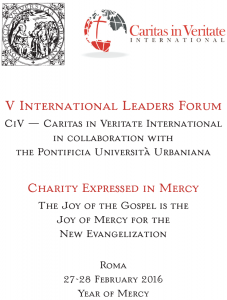UPDATED: March 2, 2016: Brian Grim spoke on the connection between religious freedom, sustainable development and mercy at this month’s fifth International Leaders Forum at the Vatican. His comments were delivered at the Pontifical University Urbaniana on February 28.
Mercy, Sustainable Development and Religious Freedom: The Harmony of Caritas in Veritate, Dives in Misericordia, Laudato Si’, and Dignitatis Humanae
He argues that we will lose the struggle for religious freedom if we focus only on legal and legislative approaches. This is because (a) they do not address the rising tide of social hostilities involving religion, and (b) it misses the greatest argument for religious freedom, i.e., that it depends on mercy and love.
He makes this argument from a point of view as a Catholic and as a global expert on the scientific study of religious freedom.
Main points:
Mercy and love are essential to religious freedom. Indeed, in the Second Vatican Council’s declaration on religious freedom, Dignitatis Humanae, mercy and love provide critical – but underemphasized – theological foundations for religious freedom. The declaration promulgated by Pope Paul VI on December 7, 1965, asserts that there can be no compulsion in matters of religion and it roots the rightness of this freedom in human dignity, with the fundamental basis of this assertion being the mercy and love of Christ. Specifically, Dignitatis Humanae (section 11, paragraph 2b) states:
For [Christ] bore witness to the truth, but He refused to impose the truth by force on those who spoke against it. Not by force of blows does His rule assert its claims. It is established by witnessing to the truth and by hearing the truth, and it extends its dominion by the love whereby Christ, lifted up on the cross, draws all men to Himself.
In short, religious freedom is “right” because the love of Christ shown in the mercy extended to all through the cross is to be embraced freely and not through coercion.
 He argues that if (a) social hostilities involving religion are now a greater challenge to religious freedom than government restrictions on religious freedom; and if (b) a majority of those outside of religious communities no longer see religion – and therefore religious freedom – as a basic force for good in society; then (c) we need a social approach to religious freedom that focuses on the main purpose of religious freedom – setting people of faith free to be incarnation of mercy and love, because, when people of faith are guided by and act on their conscience with “love, joy, peace, patience, kindness, generosity, faithfulness, gentleness, and self-control, against such there is no law” (Galatians 5:23).
He argues that if (a) social hostilities involving religion are now a greater challenge to religious freedom than government restrictions on religious freedom; and if (b) a majority of those outside of religious communities no longer see religion – and therefore religious freedom – as a basic force for good in society; then (c) we need a social approach to religious freedom that focuses on the main purpose of religious freedom – setting people of faith free to be incarnation of mercy and love, because, when people of faith are guided by and act on their conscience with “love, joy, peace, patience, kindness, generosity, faithfulness, gentleness, and self-control, against such there is no law” (Galatians 5:23).
This means that religious freedom must be much more than just protecting the dual “negative rights” of immunity from coercion in conscience and immunity from being impeded from acting in conformity with conscience. Religious freedom must be advanced by people of faith, motivated by their faith, working wholeheartedly for the common good.
In other words, the best way of advancing religious freedom today is not through legislation and litigation – though they play a part – but through the authentic love of neighbor (and even enemy) in response to the mercy and love of God to us all.

